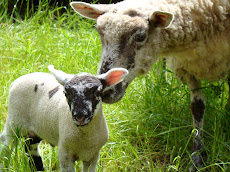Fast-forward to today. We had about 2 feet of really great compost to move onto the garden. The compost consists of kitchen scraps, straw, chicken poo and lots and lots of sheep poo. After a couple hours of shoveling and dumping I got to the bottom and guess what I ran into. Yep, a few still-not-biodegraded "biobags." 2 years! Absolutely everything else in the compost heap was fully broken down into rich dark soil, even the straw. Stupid bags!
Also found in the compost heap while shoveling were bailing twine (I guess from the straw that got tossed in), rebar (I have no idea) and sticks (presumably from the trees above the compost). The best thing though were hundreds and hundreds of worms. Every shovel full move the little wrigglers to the garden. Woot!
Once the heap was completely moved and spread out onto the garden, I let the chickens go into the now-empty-compost and scavenge for worms. They were in heaven. The pictures if 5 of the 6 pecking away, which they continued to do for at least a half-hour. Every time I took out the camera the 6th chicken got shy and left the compost to hide out in the shrubs.














3 comments:
Do you turn your compost at all, or do you just leave it to break down entirely on its own? Our compost has been building for a few years with just fall leaves, household scraps, and a few shovel-fulls of dirt. It IS breaking down, but VERY slowly. I'm guessing the manure helps it go much quicker, but wasn't sure if you did anything else to it.
It is best to turn the compost. Air plus water equals good decomp. But I'm lazy and I don't turn it. Once a year we clear the compost to the gardan, so it gets a good turn over. But that's all we do.
Also, it is important to have a half and half mix of "greens" and "browns". Greens are kitchen scraps, coffee grounds, sheep poop. Browns are leaves, straw, newspaper. Having a good mix feeds the worms.
Post a Comment